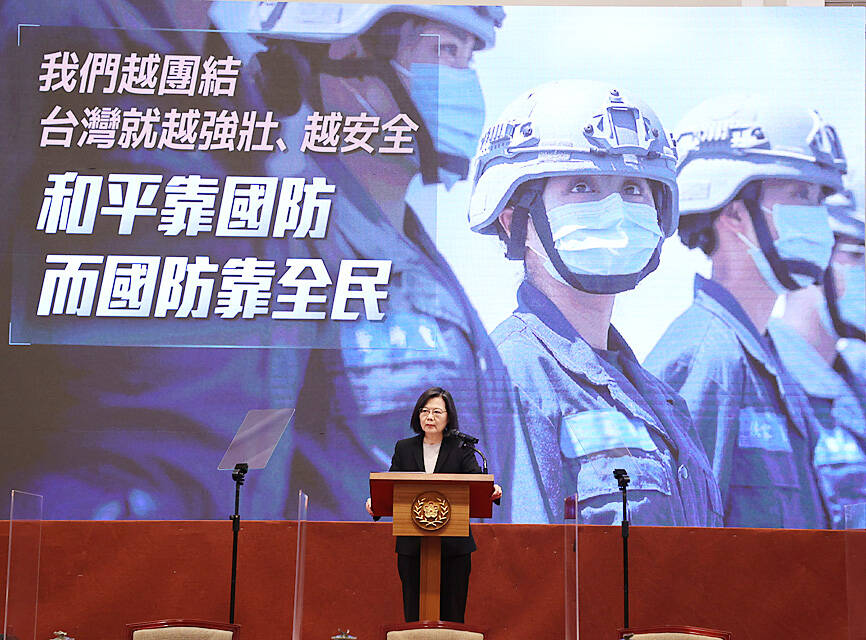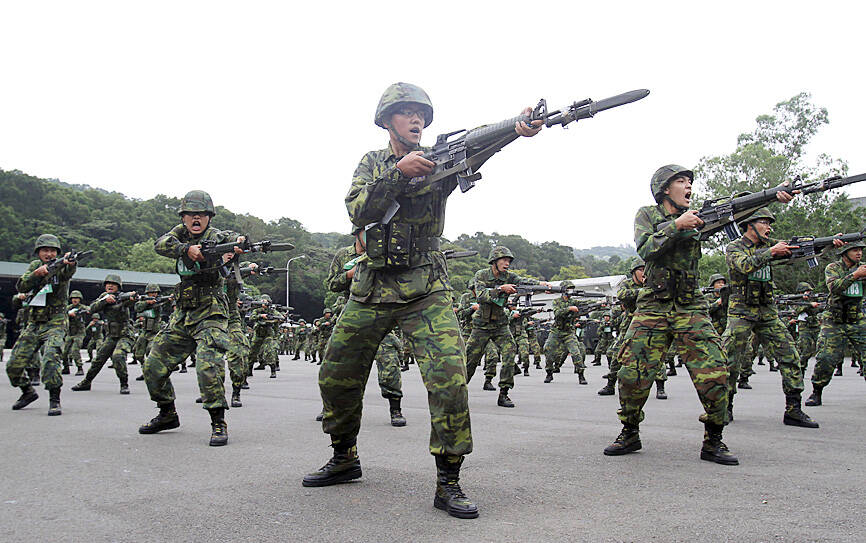Conscription is to be restored to one year for all men born after Jan. 1, 2005, starting in 2024, President Tsai Ing-wen (蔡英文) said yesterday as part of an updated national defense plan.
“The decision is a difficult one, but as the head of the military and for the continued survival of Taiwan, this is an inevitable responsibility,” Tsai said.
As well as returning the mandatory service period to one year, the government is enacting other changes affecting the nation’s military composition, affirming that the volunteer force is to be the nation’s main military arm and establishing a standing defense force mainly comprised of those serving their mandatory service.

Photo: CNA
The government is also looking to bolster its reservist system and would consider implementing a militia system, Tsai said.
The starting salary for conscripts would be increased to NT$26,307 from NT$6,510 to ensure they earn enough to cover their basic daily expenses, she said.
However, the disposable income portion of the salary would be NT$20,320 per month, with the army to provide NT$5,987 to cover meals and insurance, she said.

Photo: Chiang Ying-ying, AP
The announcement was made after Tsai held a round of meetings at the Presidential Office in Taipei with high-level officials to discuss Taiwan’s economic and national security, following months of discussions in the wake of the Russian invasion of Ukraine.
Ukraine is still fighting after more than 300 days, and its resolve to defend itself is an example for everyone who loves and cherishes freedom, Tsai said.
With the Chinese threat looming, Taiwan must prepare for war, and ensure that it can fight to prevent war or end it if one begins, she said.
Many people have stereotypical views of mandatory service based on their own experience, but the training regimen has undergone drastic changes, Tsai added.
To ensure conscripts undergo appropriate training and do not waste time during the longer service period, they would undergo more intense and longer boot camp training to boost their combat preparedness, the president said.
Boot camp training is to be extended to eight weeks from five, and is to include physical fitness and exercise, as well as weapons and combat training.
Standard courses would focus on discipline, equipment maintenance, basic training and stress training, while physical training would include basic fitness, grenade throwing and a 500m obstacle course.
Physical training is to incorporate science-based learning for health management and muscle-building.
The arms training section would increase the number of shots fired from 104 to 160 to ensure that recruits know the differences between weapons and how firing position affects accuracy.
Combat training is to focus on combat techniques, field medicine and what to do in the event of a biological or nuclear disaster, while the training regimen for recruits is to include marches, camp setting and other skills.
The Ministry of Education is in talks with local universities and colleges to develop ways to make the higher-education curriculum more flexible so that conscripts can complete their required one year of service while studying, Tsai said.
That would allow them to avoid postponing plans to enter the job market due to the longer military service requirement, she said.
Since 1949, when the Republic of China government retreated to Taiwan, Taiwanese men have been required to serve two or three years in the military.
After 2000, conscription was gradually reduced to one year by 2008.
Under former president Ma Ying-jeou (馬英九) of the Chinese Nationalist Party (KMT), who was in office from 2008 to 2016, the government turned the nation’s military into a mainly volunteer force, with conscripts, serving in support roles, only required to undergo four months of military training since 2013.
During the four months, conscripts undergo five weeks of boot camp followed by 11 weeks of specialized training with field units.
Additional reporting by Chen Yun

The CIA has a message for Chinese government officials worried about their place in Chinese President Xi Jinping’s (習近平) government: Come work with us. The agency released two Mandarin-language videos on social media on Thursday inviting disgruntled officials to contact the CIA. The recruitment videos posted on YouTube and X racked up more than 5 million views combined in their first day. The outreach comes as CIA Director John Ratcliffe has vowed to boost the agency’s use of intelligence from human sources and its focus on China, which has recently targeted US officials with its own espionage operations. The videos are “aimed at

STEADFAST FRIEND: The bills encourage increased Taiwan-US engagement and address China’s distortion of UN Resolution 2758 to isolate Taiwan internationally The Presidential Office yesterday thanked the US House of Representatives for unanimously passing two Taiwan-related bills highlighting its solid support for Taiwan’s democracy and global participation, and for deepening bilateral relations. One of the bills, the Taiwan Assurance Implementation Act, requires the US Department of State to periodically review its guidelines for engagement with Taiwan, and report to the US Congress on the guidelines and plans to lift self-imposed limitations on US-Taiwan engagement. The other bill is the Taiwan International Solidarity Act, which clarifies that UN Resolution 2758 does not address the issue of the representation of Taiwan or its people in

US Indo-Pacific Commander Admiral Samuel Paparo on Friday expressed concern over the rate at which China is diversifying its military exercises, the Financial Times (FT) reported on Saturday. “The rates of change on the depth and breadth of their exercises is the one non-linear effect that I’ve seen in the last year that wakes me up at night or keeps me up at night,” Paparo was quoted by FT as saying while attending the annual Sedona Forum at the McCain Institute in Arizona. Paparo also expressed concern over the speed with which China was expanding its military. While the US

SHIFT: Taiwan’s better-than-expected first-quarter GDP and signs of weakness in the US have driven global capital back to emerging markets, the central bank head said The central bank yesterday blamed market speculation for the steep rise in the local currency, and urged exporters and financial institutions to stay calm and stop panic sell-offs to avoid hurting their own profitability. The nation’s top monetary policymaker said that it would step in, if necessary, to maintain order and stability in the foreign exchange market. The remarks came as the NT dollar yesterday closed up NT$0.919 to NT$30.145 against the US dollar in Taipei trading, after rising as high as NT$29.59 in intraday trading. The local currency has surged 5.85 percent against the greenback over the past two sessions, central